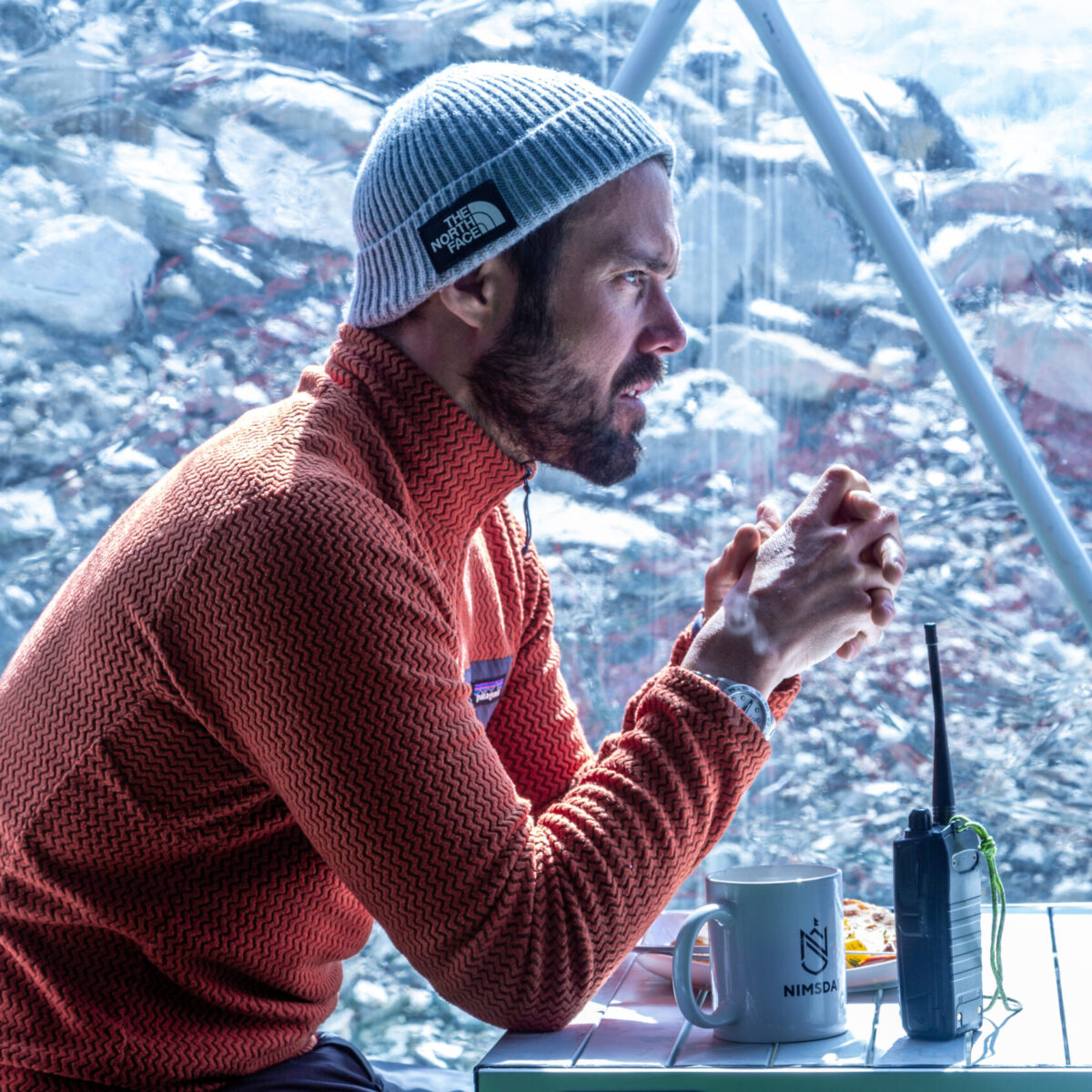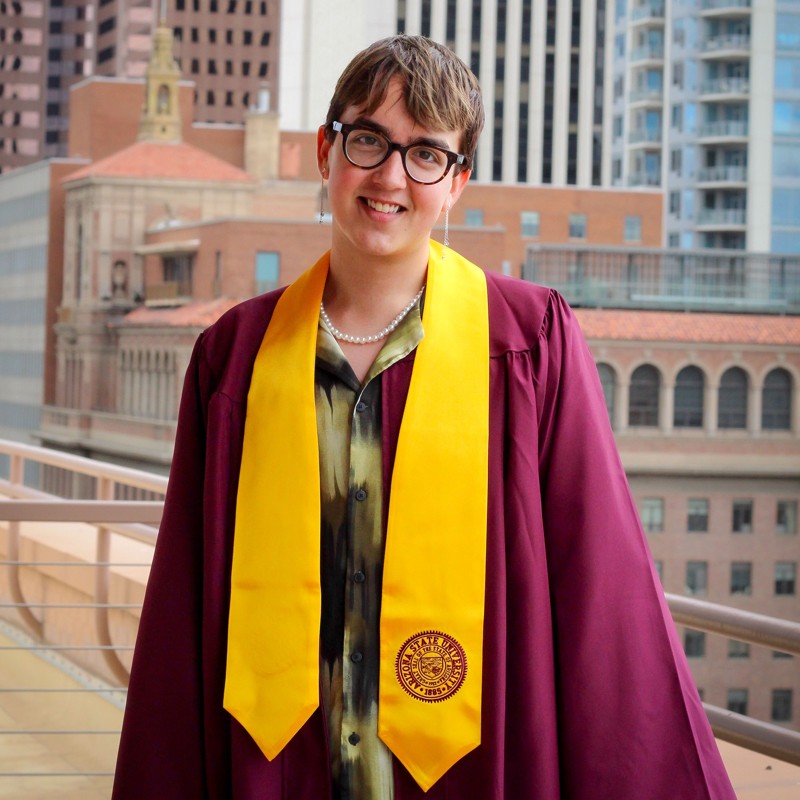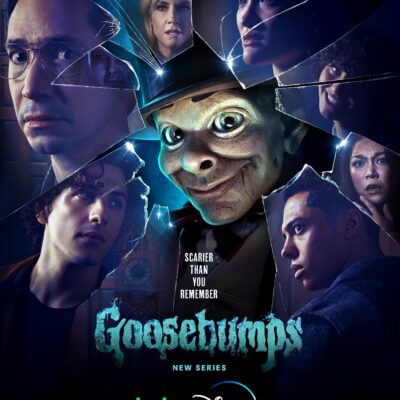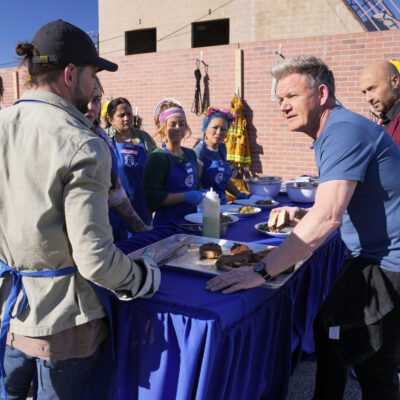Spencer Matthews is having a very busy year. Not only is he running the fastest-growing non-alcoholic spirits company, CleanCo, but he’s also the host of his very own podcast, Big Fish with Spencer Matthews, which includes weekly special guests like his wife, Vogue Williams, and the legendary Gordon Ramsay.
Oh, and did I mention he just released a documentary about his life-changing expedition on Mount Everest?
Finding Michael, which is now available to stream on Hulu in the U.S. and on Disney+ overseas, is a heartfelt documentary that explores Matthews’ loss of his brother, Michael, who died on Mount Everest over two decades ago. Honoring the incredible legacy of his brother, Matthews curates a team of professionals to go on a Mount Everest expedition, and the central goal is to recover Michael’s body from the mountain.
The journey to recovering Michael’s body is not an easy one, and through many trials and tribulations, Matthews showcases the triumph of the human spirit and explores the physical and mental obstacles that come with enduring Mount Everest. This tale of optimism, hope, and a desire for closure will resonate with anyone who has experienced the loss of a loved one before.
Pop Crave spoke with Spencer Matthews to learn more about his new documentary, Finding Michael, the advice he got from Bear Grylls before hiking up Mount Everest, and the most impactful moments he had while trying to recover his brother’s body. Keep reading for the full interview!
Hi Spencer! First of all, congratulations on Finding Michael. It’s already one of the most well-rated and most-watched documentaries on Disney+ overseas. So many people are now hearing about your brother’s incredible legacy for the first time. What does all of the positive reception to the documentary mean to you?
I’ve never felt nervous about anything that I’ve done professionally before, so this was a change for me. It being a very personal project, and obviously it being kind of so close to home, it’s a story that I haven’t been very vocal about throughout my teens and 20s. People receiving it well meant the world to me. The night before the premiere, I was experiencing all kinds of feelings that I hadn’t really felt before and was on one hand, you know, very keen for people to finally see it. This is two years in the making. And I suppose for me, you could say it’s 23 years in the making. I’ve always had a kind of desire somewhere to bring Michael home, but obviously as a child, that was difficult to orchestrate. The fact that it’s been received the way it has was incredible. I mean, I’ve not ever felt a reception like it for anything I’ve done. That meant the world to me and our family.
I know you found the photo of your brother and had made up the idea for this journey a long time before it actually came about. How long, would you say, does the preparation for an expedition like this take on average?
It depends on the person, I suppose. In our case, there were all kinds of logistics that needed to be managed in order to film a documentary at that altitude. Parts of it at that altitude have never been done before. We have the highest footage ever recorded, we believe, at least, certainly that’s been published or shown. And in terms of physicality, climbing Everest is a grueling feat. Fortunately, this documentary wasn’t really about my journey to the top of Everest, for a number of reasons, but mostly out of respect to my mother, father, and family. I didn’t want to, or was advised not to, go past base camp. We hired one of the best teams, if not the best team in the world, to orchestrate the search.
Part of the obstacle that we had to clear in our own minds for this to be acceptable was the level of risk to human life in the process of trying to recover Michael. The only way that we could have been made comfortable to even begin this journey was by having the best possible people involved: the best Sherpas, the best team, the best mountaineering leader, Nims Purja, and he was able to make us feel about as comfortable as we could in order to proceed. But their physicality and physiology is different to us. You know, I’d like to think I’m a pretty fit person. I value my health, I stay in shape, but climbing at a very high altitude is something that you practice and become good at. But also, you need to hope for certain physiological advantages that you may or may not have. People respond differently at altitude. Fortunately, we were all fine.
Finding Michael is executive produced by mountaineer Nirmal Purja and the legendary Bear Grylls, and they’re also featured in the documentary. What’s the best piece of advice that you received from both of them during this process?
Bear and I are friends. We met for the first time when I was 14. Bear came to give a talk at the school that I was at about being the youngest Brit to climb Everest, and I challenged him on that publicly because my brother was the youngest to summit, and he had described himself as the youngest to summit. I asked him if he knew my brother, and he said that he did and was incredibly warm, kind, and welcoming to me. He even credited my brother in his first book, Facing Up, and has always held him in quite high regard, I feel, for his achievement but also just as the kind of person that he was. So, I’ve known Bear kind of on and off for a while. I didn’t realize that I would have any kind of career in media, so our paths have crossed a few times. And he didn’t come to Nepal. He stayed in the UK but was able to offer me great advice and provide the family with security, I suppose, that the story would be told respectfully. I think he has a lot of experience with this kind of stuff. A concern was that we needed the story to be told perfectly, and we needed to make a film that was really beautiful but long lasting in people’s minds all being well.
Bear was great and keen to be involved, and it was his advice for me to not go past base camp. I think his exact words were, “Do you go through the jaws of death just to get that little bit closer?” And he’s referring to the Khumbu Icefall, which is the most dangerous part of climbing Everest between base camp and camp one. I’m naturally adventurous, I enjoy pushing myself through limits, but again, this wasn’t about me conquering Everest. The reality is you would just get in the way of the Sherpa who are incredible. On the second search, they pushed from base camp straight to camp four, which could easily kill me regardless of how fit you are. You wouldn’t want to get in their way. We purposefully, as I said before, hired an elite team of the best climbers in the world, and this was not a moment for me to test my ego on the mountain.
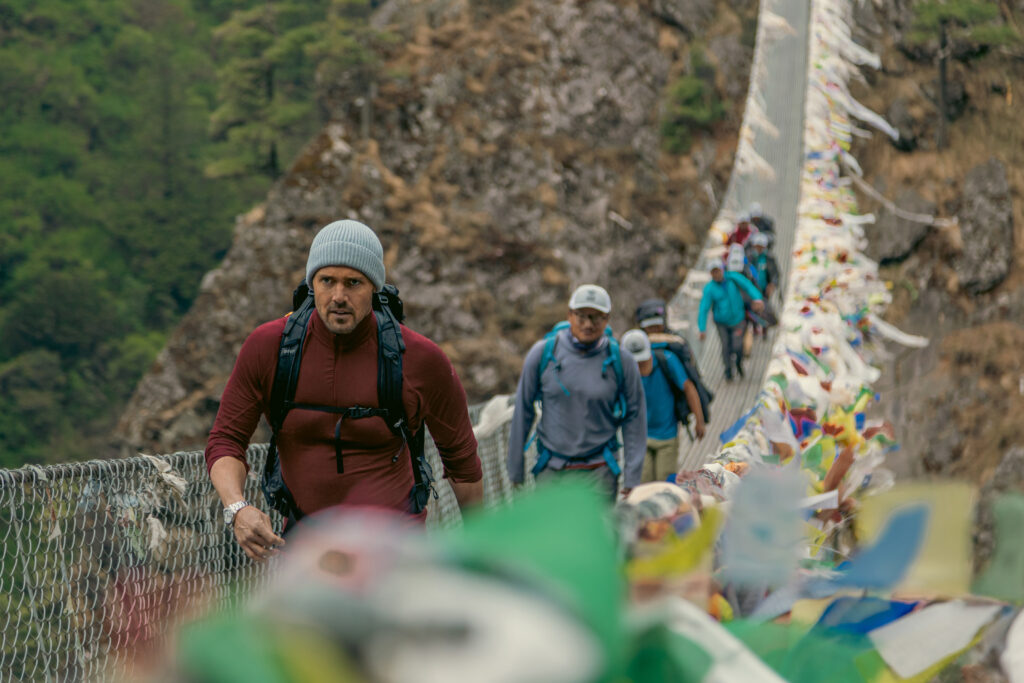
How much safer would you say it is now to hike Mount Everest than it would’ve been in 1999?
Yeah, absolutely! I mean, it’s far more commercial now. The amount of people that climb Everest now compared to 1999 is far greater. Advances in kits, oxygen systems, and weather reporting are the three big ones that make it more accessible and easier nowadays, but that does not mean to say that it is risk free, of course. If you’re well looked after, you should be okay, but natural disasters occur up there all of the time, every year. If you’re in the wrong place at the wrong time on Everest, it doesn’t really matter who you are. Nims Purja or an inexperienced westerner, your goose will be cooked through the icefall mostly. There’s very little you can do to control the Khumbu Icefall. Essentially, people go through it in the middle of the night at 3 or 4 a.m. so that it’s as frozen as it can be. It’s like a waterfall that is constantly moving, but it’s frozen. It will move roughly, on average, one meter per day, but that can remain bunched up and just slide four or five meters in one go. In doing so, large and kind of cathedral-sized blocks of ice can just wipe through it. If you happen to be stood there at the time, there’s not much you’ll be able to do.
This documentary is very much about closure and finding peace, and we get to see you experience all of that throughout Finding Michael. When do you think the moment was during this whole journey where you felt the most at peace and the most healed?
It’s kind of a difficult question. The whole experience for me was quite emotional. I have suppressed emotion for most of my adult life. Nothing really bothers me. I’m a pretty black and white person. You know, I’m not an openly emotional person, nor am I that easily moved by stuff, and I found my first sighting of Everest to be quite emotional when we saw Everest for the first time. We just came through Namche Bazaar. You’re fully at altitude by that point, you know, where walking up a flight of stairs causes heavy breathing even if you’re very fit. It’s the most amazing place, actually, Namche Bazaar. Incredible, actually, and really cool… There are bars, pharmacies, restaurants, pizzerias, and all kinds of stuff that you would just assume wouldn’t be up there. Just through Namche Bazaar, you can see Everest for the very first time. I say in the film, “That’s the closest I’ve been to Michael in 23 years,” you know, since I said goodbye to him in the hotel lift when he left me. I have not been physically that close to him since. And seeing the mountain made me kind of realize that, and it gave the journey a real sense of purpose that what we were doing felt right.
Also, we hiked through a Buddhist monastery. I can’t remember the name of the monastery, but it was in Tengboche. In fact, I think it’s called the Tengboche Monastery. It was remarkable. We had this kind of spiritual experience. In this monastery where you’re blessed, the same monastery that Michael was blessed in, I was blessed in. And they play this quite enchanting music, and there are children banging these drums that make you feel quite enlightened. And again, I’m not a religious person, per se, but I then spoke to a monk who educated me about rites of passage and how one moves from one life to the next, particularly in their culture, and how recovering Michael’s body would be the most incredible thing. There was a sense before we left that, you know, I really hope that we don’t offend the culture up there. It’s a very rich culture. The Sherpa community is very powerful, and so is the Buddhist community in Nepal. The last thing we would want would be to be that film crew of westerners that are disturbing the peace type thing, and we weren’t. We were welcomed with an incredible kind of compassion and open arms, and just the whole experience felt wonderful.
Another moment was, and I won’t ruin the ending of the film because obviously I would love people to watch it – and I wouldn’t do the ending justice – but the ending is very emotional. And I have not ever felt like that in my life. I don’t think so… Also, I was at base camp for four and a half weeks. Base camp is a very strange place to live. It would be like the equivalent, I would imagine, of living on the moon. There’s nothing going on. There’s 1,000 people there, but I saw 10. You kind of just keep to yourself and don’t do anything, really. You’re at very high altitude… You’re nearing the summit of Kilimanjaro, Africa’s highest peak, and you’re living there for four and a half weeks. You’re tired, you’re rundown, there’s no comfort, and you don’t sleep properly at all. The whole time I was there, I maybe got three hours a night. Of course, we’re also in the process of looking for Michael, attempting the highest body recovery on record. There’s danger in that, there’s emotion in that. I felt pretty emotional when we would find bodies that weren’t Michael. For me, it just felt like, “We found a body! It could be a match.” So, I’m at base camp having these kinds of strange releases thinking that, “God, I’m gonna come face to face with my frozen brother that I haven’t seen in 23 years!” It became, well, pretty irritating every time it wasn’t him, you know [laughs]?
I think when you’re not sleeping properly, you are a bit rundown, and you are, in many ways, kind of desperate for something, you tend to be more emotional than the normal, I would say. Yeah, just the whole experience was very memorable.

I love that the documentary showcases you being very vulnerable and emotionally open with the audience. I think society can sometimes make men feel like they’re forced to suppress their emotions all the time. Would you say that prior to this documentary, you had sometimes felt pressure throughout your life to not be as open or emotionally vulnerable as you maybe wanted to be?
Yeah, I suppose so. I just have no real experience of being emotionally vulnerable. Like, I kind of wish I was more. I don’t do it because I feel backed into a corner by society or that men shouldn’t be vulnerable. I’m just not vulnerable. I kind of wish as a husband, father, and father of three that I could be more emotional, I suppose. But I also find that being the way I am can be quite helpful too [laughs]. So, I’m not saying I want to completely rewire my nature, but it felt nice. And I’m happy to talk about anything. I’ve always been a very open, honest person. I abused alcohol for all of my 20s and developed what I believe to be an amazing brand, which is now in the states, called CleanCo. It’s all about drinking too much and wanting to live a cleaner life, and I’m always very honest about that. I don’t feel that this vulnerability is refreshing or wrong. It’s just we made a film that I hope people love, and I’m telling the truth about how it felt to make it.
Okay, so this is the final question! You’ve done so many reality shows, a documentary, and you’ve also been working on CleanCo, your non-alcoholic spirits company that you founded. Career wise, what do you think is next for Spencer Matthews?
I’d love to make more documentaries! I really enjoyed that process. Obviously, the subject matter won’t always be as personal as that, but I find storytelling and filmmaking to be something I care about. I mean, I was a reluctant podcaster at first. I think during the pandemic, my wife and I decided to jump on the podcast train just because everybody else seems to be doing it. Now, I have three podcasts, all of which I love. I’d love to do more with Bear Grylls; I think he’s the most amazing guy. So, who knows? You know, hopefully there’ll be lots of exciting things that we can tackle moving forward. CleanCo, of course, is very important to me and very dear to my heart. We’re looking at really aggressively expanding in the U.S. this year. We have all kinds of incredible deals with the largest distributor in your fine nation. We really want to bring clean drinking to the U.S. in a meaningful way.
I couldn’t be busier to be honest, mate. What the film did for me was made me realize how investing lots of time into a single project can feel. I haven’t ordinarily done that. I’ve done a lot of appearing in a lot of things that aren’t mine, you know, so being able to make stuff that is yours and that matters to you, I think, is kind of a step and change that I’m interested in. Just doing stuff that matters to you, you know, and not participating in somebody else’s format.

Finding Michael is now streaming on Hulu in the U.S. and on Disney+ overseas.

